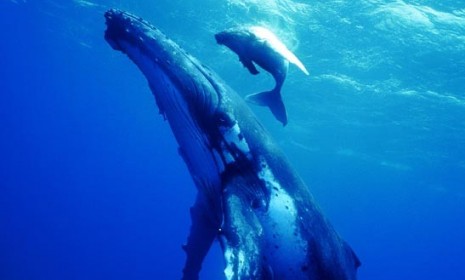Is global warming shrinking sea creatures?
Researchers discover a link between warmer oceans and smaller animals — suggesting that climate change could fill the waters with shrimpy creatures

A free daily email with the biggest news stories of the day – and the best features from TheWeek.com
You are now subscribed
Your newsletter sign-up was successful
Scientists have long observed that cold-blooded marine animals grow up to be slightly smaller adults when the water they live in is unusually warm. But the reason for this phenomenon, known as the "temperature-size rule," has long eluded scientists — until a recent study offered new insights. A concise guide to the findings:
How was this study conducted?
Scientists at Queen Mary, University of London, studied marine planktonic copepods — the ocean's primary form of plankton and a source of food for many marine animals. Using more than 40 years of existing data, the team measured two things: The animals' growth rates ("how fast mass is accumulated") and development rates ("how fast the animal passes through life stages").
The Week
Escape your echo chamber. Get the facts behind the news, plus analysis from multiple perspectives.

Sign up for The Week's Free Newsletters
From our morning news briefing to a weekly Good News Newsletter, get the best of The Week delivered directly to your inbox.
From our morning news briefing to a weekly Good News Newsletter, get the best of The Week delivered directly to your inbox.
What did they find?
Warmer water temperatures cause a "decoupling" of growth and development rates in the tiny shrimp-like creatures. Researcher Andrew Hirst explains: In warm water, "a species grows faster but matures even faster still, resulting in them achieving a smaller adult size."
Why should we care about these tiny plankton?
These creatures matter plenty, at least to the oceans' ecosystem. According to Tim Wall of Discover, "Since copepods are food for marine animals, from fish to whales, what happens developmentally to the shrimp-y crustaceans could affect the entire ocean's food web." Smaller plankton means less food to go around at the base of the ocean's food chain.
A free daily email with the biggest news stories of the day – and the best features from TheWeek.com
And what does this have to do with global warming?
Global warming is causing our planet's oceans to get a little hotter every year. And because this "temperature-size rule" affects all cold-blooded marine animals, "as the planet heats up, many animals' sizes may go down," Wall says.
Sources: Discover, International Business Times, United Press International
-
 Corruption: The spy sheikh and the president
Corruption: The spy sheikh and the presidentFeature Trump is at the center of another scandal
-
 Putin’s shadow war
Putin’s shadow warFeature The Kremlin is waging a campaign of sabotage and subversion against Ukraine’s allies in the West
-
 Media: Why did Bezos gut ‘The Washington Post’?
Media: Why did Bezos gut ‘The Washington Post’?Feature Possibilities include to curry favor with Trump or to try to end financial losses